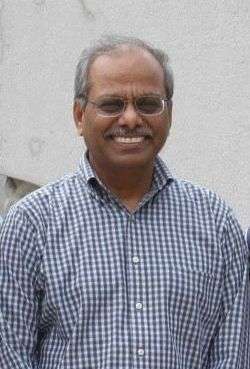Rakesh Agrawal (chemical engineer)
| Rakesh Agrawal | |
|---|---|
|
Agrawal in 2012 | |
| Residence | United States |
| Fields | Chemical Engineering |
| Institutions | Purdue University |
| Alma mater |
Indian Institute of Technology Kanpur B.Tech. 1975 University of Delaware M.ChE. 1977 Massachusetts Institute of Technology Sc.D 1980 |
| Known for | Cryogenic Air Separation |
| Notable awards |
National Medal of Technology and Innovation (2011) IRI Achievement Award (2007) |
Rakesh Agrawal is a National Medal of Technology and Innovation Laureate [1] as well as the Winthrop E. Stone Distinguished Professor of chemical engineering at Purdue University.[2] Previously he was employed for more than two decades with Air Products and Chemicals, Inc., where he was elected to the highest technical position in the company, an Air Product Fellow, before moving to Purdue in 2004.
His technical contributions towards improving the energy efficiency of separation plants producing industrial gases such as O2 and N2 from air, and in the general area of gas liquefaction and separation, has led to 116 US patents and 500 international patents along with several peer-reviewed publications. In recognition of his technical accomplishments during his more than two decades at Air Products and Chemicals, Inc., he was announced as the recipient of National Medal of Technology and Innovation for 2011, by the White House.[3]
His efforts have also been recognized by previously received awards including, J & E Hall Gold Medal from the Institute of Refrigeration (UK),[4] Presidential Citation for Outstanding Achievement from the University of Delaware,[5] Industrial Research Institute (IRI) Achievement Award and from the AIChE:[6] the Gerhold, Excellence in Industrial Gases Technology, Institute Lecture, Chemical Engineering Practice, and Fuels and Petrochemicals Division awards. In 2002, he was elected as a member of the US National Academy of Engineering.[7]
At Purdue, Agrawal's current research initiatives are in the area of renewable energy, including developing low-cost methods for synthesizing solar cells based on Nanotechnology,[8] efficient conversion to biomass to liquid fuel for transportation and maximizing liquid fuel from a given quantity of biomass.[9] He is also engaged in an energy systems analysis initiative to explore the role of biofuels vis-a-vis other solar energy derived alternatives to propel a future transport sector.[10] That work has evolved with Professor Agrawal becoming the principal investigator in the NSF sponsored Solar Economy IGERT involving researchers at Purdue University, University of Delaware, UTEP, and HZB.[11] In addition, he continues to engage in research pertaining to improving the energy efficiency of separation processes, with the focus on energy efficient distillation configurations for multicomponent separations as well as membrane based separation processes.[12]
He received a B. Tech. from the Indian Institute of Technology Kanpur, India in 1975; a M.Ch.E. from the University of Delaware in 1977, and an Sc.D. in chemical engineering from the Massachusetts Institute of Technology (MIT), 1980.[13]
In 2013 Rakesh Agrawal became an elected member of the American Academy of Arts and Sciences.[14]
References
- ↑ "National Medal of Technology and Innovation winners for 2011".
- ↑ "Rakesh Agrawal, Chemical Engineering, Purdue University".
- ↑ "National Medal of Technology and Innovation winners for 2011".
- ↑ "J and E hall gold medal winners".
- ↑ "University of Delaware- Presidential Citations list".
- ↑ "IRI Achievement award".
- ↑ "NAE members".
- ↑ "Solar Energy Research, Purdue University".
- ↑ "Liquid Fuels Research, Purdue University".
- ↑ "Liquid Fuels Research, Purdue University".
- ↑ "Solar Energy IGERT, Purdue University".
- ↑ "Liquid Fuels Research, Purdue University".
- ↑ "Rakesh Agrawal, Chemical Engineering, Purdue University".
- ↑ "American Academy of Arts and Sciences Newly Elected Members 2013" (PDF).
